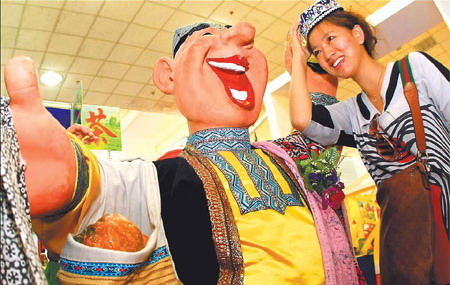|
 A visitor to the 18th Urumqi Trade Fair gets a close look at Bayi, the 'wealthy lord', Tuesday at the opening of the event in the Xinjiang Uygur autonomous region. The trade fair has attracted more than 500 overseas business people from 29 countries and regions. [Photo by Zhou You/China Daily] A visitor to the 18th Urumqi Trade Fair gets a close look at Bayi, the 'wealthy lord', Tuesday at the opening of the event in the Xinjiang Uygur autonomous region. The trade fair has attracted more than 500 overseas business people from 29 countries and regions. [Photo by Zhou You/China Daily] | URUMQI: Overseas investors received assurances Tuesday that the Xinjiang Uygur autonomous region remains a safe place for them and their money, despite the July 5 riot.
"It is safe for foreign businesspeople to invest in Xinjiang. They should not have safety concerns," said He Yiming, director of the regional government's commerce department.
He made the remarks at the opening ceremony of the 18th Urumqi Foreign Economic Relations and Trade Fair, which started Tuesday and will continue until Saturday.
The event was held as originally scheduled, despite coming less than two months after the July 5 riot in Urumqi, the region's capital, which claimed 197 lives and injured at least 1,600 others.
Booths at the exhibition were sold out long before the fair began, proving that the riot did not change Xinjiang's geographical advantage, Nur Bekri, the regional government chairman, was quoted as saying by the Xinhua news service.
Foreign businesspeople at the fair echoed those sentiments, saying the riot had not shaken their confidence in Xinjiang.
"The riot was a terrible incident but it is over now and our business ambitions in Xinjiang are not affected by it," said Utepova Asem, director of Kazakhstan's Kaz Trans Logistic.
Li Hu, a representative from Home Seasons, a Hong Kong-based home decoration company, said the security situation in Urumqi had improved significantly.
"We are confident that people and businesses in the region will step out of the shadow of the riot soon," Li said.
Hadi Jafarinejad, general manager of Shiraz Moquettee, a carpet maker from Iran, agreed that the future for the region was bright.
"It's the first time I have visited Xinjiang," he said.
"My colleagues and I all feel very safe here. The riot happened and now it's gone, but Xinjiang's huge market potential remains. That's the reason we are seeking business opportunities here."
Security precautions for the trade fair were of the "highest level" and police prepared plans to ensure it proceeded without a hitch. Lighters, cigarettes and event bottled water could not be taken inside the venue, as a precaution.
Xinjiang, the largest among China's provinces, municipalities and regions, borders many countries and accounts for one-sixth of China's total land mass.
The vast region is a conduit for massive amounts of trade between China and its neighbors, especially with Russia and Central Asia countries. Foreign trade through the region hit a record high of $22.2 billion last year and this year's target is $27.8 billion ($24 billion in exports and $3.8 billion in imports).
Strong support from the central government for the development of Xinjiang, including the expansion of rail, road, airport and water infrastructure, will further expand foreign trade, said He Yiming.
"By investing in Xinjiang, businesspeople and enterprises can have both China's domestic market as well as the neighboring Central Asian countries markets on their radar. They can have two markets with a combined population of 2.6 billion people," He added.
He said both labor and production costs in Xinjiang were highly competitive.
The annual trade fair, China's only business event targeting Central, Western and Southern Asia, was upgraded from a regional event to one of China's major international business gatherings in 2008.
Deals worth $20 billion were signed there last year.
Cai Ke contributed to the story |



